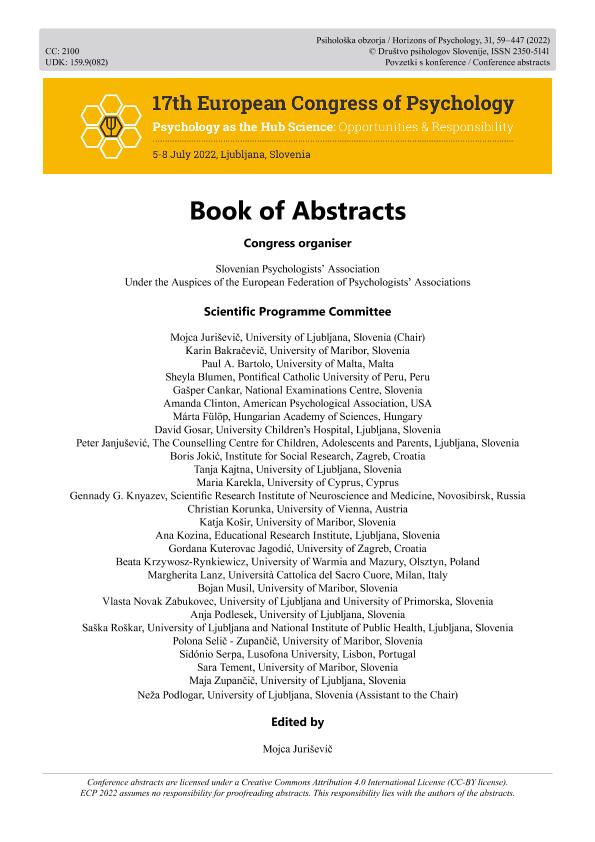Evento
The Protection Motivation Theory as a Predictor of the Use of Protective Behavioral Strategies among Young Adults
González Ponce, Bella; Carmona Márquez, José; Vera, Belén del Valle ; Pautassi, Ricardo Marcos
; Pautassi, Ricardo Marcos ; Fernández Calderón, Fermín
; Fernández Calderón, Fermín
 ; Pautassi, Ricardo Marcos
; Pautassi, Ricardo Marcos ; Fernández Calderón, Fermín
; Fernández Calderón, Fermín
Tipo del evento:
Congreso
Nombre del evento:
17th European Congress of Psychology
Fecha del evento:
05/07/2022
Institución Organizadora:
lovenian Psychologists’ Association;
Título de la revista:
Horizons of Psychology
Editorial:
Slovenian Psychologists' Association
ISSN:
2350-5141
Idioma:
Inglés
Clasificación temática:
Resumen
Alcohol Protective Behavioral Strategies (PBS) have shown to be effective in minimizing alcohol-related negative consequences. However, previous studies on the explanatory factors of PBS use are scarce. The Protection Motivation Theory (PMT) is a social cognition theory which attempts to explain intention to use protective behaviors in respond to health threats such as alcohol-related negative consequences. According to PMT, the likelihood of engaging in protective behaviors when facing a threat is a product of two processes: threat appraisal (perceived severity and perceived vulnerability to the threat) and coping appraisal (response efficacy and perceived self-efficacy for using a protective behavior). We examined the predictive utility of the PMT on the intention to use PBS related to the Manner of Drinking (MOD) among a community sample of young adults. Prospective study that recruited 360 young adults aged 18-24 years by targeted sampling procedure (Mage=21.15 [SD=2.23]; female=50.3%). Most baseline participants (94.2%, n=339) completed a 2-months follow-up assessment. Perceived severity and perceived vulnerability to alcohol use, perceived efficacy of MOD strategies to reduce alcohol-related negative consequences, and self-efficacy to engage in MOD strategies were measured at baseline, and intention to use MOD strategies at follow-up. A multiple lineal regression model for predicting intention to use MOD strategies was used. Perceived severity (β=.13, p=.017), response efficacy (β=.270, p<.001), and selfefficacy (β=.240, p<.000) were positively associated with high intention to use MOD protective strategies. In line with previous research, our findings demonstrated that coping-appraisal components of PMT are more explanatory of protective behaviors than threat-appraisal components. These results may be useful to inform interventions aimed at increasing PBS use among young adults.
Archivos asociados
Licencia
Identificadores
Colecciones
Eventos (IIPSI)
Eventos de INSTITUTO DE INVESTIGACIONES PSICOLOGICAS
Eventos de INSTITUTO DE INVESTIGACIONES PSICOLOGICAS
Citación
The Protection Motivation Theory as a Predictor of the Use of Protective Behavioral Strategies among Young Adults; 17th European Congress of Psychology; Liubliana; Eslovenia; 2022; 379-379
Compartir



